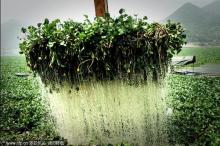Barriers for the employment of floating invasive weeds for biogas production in local communities in West African Developing Countries

Currently many eyes are focussed on and a lot of money is spent in renewable energy projects, because one day they are supposed to substitute fossil fuels and nuclear power. Within renewable energy sources bio fuels have especially been criticized for contributing to the food vs fuel debate. Invasive, floating aquatic weed species like E. Crassipes (Water hyacinth) invade water systems in tropical areas without giving a chance of getting rid of them on the long term at the current state of science. They might even hinder local fishermen from carrying out their income creating activities. This thesis aims to study the viability of combining these two problematiques and of their mutual solving. By using floating invasive weeds for biogas production, no loss in food crops has to be suffered and on the other side there is an extra benefit of harvesting these weeds; the benefit of biogas for the community, that can be used for cooking, lighting and electricity purposes. The main research question for this thesis is: “What are the opportunities for the deployment of floating invasive weeds for biogas production in local communities in Western Africa?” As methodology Strategic Niche Management (SNM) has been adopted since it offers the barriers that an upcoming technologies has to face from three levels; the landscape at the macro level, the regime at the meso level and the niche at the micro level. The landscape refers to the world in which a technology finds itself embedded, consisting this world in the macro economy, the demography, infrastructure and political and social views and structures. A socio-technical regime refers to the procedures and ‚ways of doing‘ of a socio-technical system embedded in the landscape. A niche is a candidate for being part of the regime. When pressure is put by the landscape on the regime, it becomes weak and niches have higher probability to „abuse“ this lability and getting into the regime. For this purpose learning processes, forming of expectations and strategies and network formation play a fundamental role. This thesis focusses on the niche level of biogas production from floating invasive weeds. This has been done by literature research and complemented by a 3 week field work in Ghana and Bénin, where I was able to meet researchers of both weed control and biogas technology as well as I could visit the only implemented biogas reactor on E. Crassipes in Bénin. Due to the fact that most of my contacts were to find in Ghana, I decided to focus on this country. A brief look into three regimes in Ghana, the weed control regime, the cooking regime and the lighting regime shows that the weeds are usually controlled with bugs, most of the Ghanaian population cooks on firewood and charcoal and everyone without electricity coverage uses kerosene for lighting. Biogas plants are usually installed as a response to waste water problems of hospitals or schools, while the use of other feed stocks is not used in a high number of cases. Literature indicates that the conversion into biogas of E. crassipes is possible with a reasonable yield.
SNM analysis reveals that the idea of biogas digestion is not yet set in mind of most of the people, it still is kind of a ‚miracle‘. Nevertheless, the knowledge on biogas technology is shared at pilot project sites with decision makers. Biogas technology is growing in Ghana but still has to fight competition with other renewable energy systems and is heavily dependent on lower subsidies on fossil fuels. Based on observations made in the field trip and on literature, the niche analysis proves the viability of setting up a pilot project, since 12 working people would be able to run a simple system with a grinder, a drying place and a digester, to meet by this the electricity, lighting and cooking needs of a 100 household community. As the financial cost benefit analysis also show absolute positive values, investors and policy protection should be able to be attracted easily and by this the first step towards becoming a niche could be made.
